"The mediocre teacher tells. The good teacher explains. The superior teacher demonstrates. The great teacher inspires." -William Arthur Ward
Every so often, people get up-in-arms about teaching and education in college. New studies come out, new methods are touted and tried, curricula get revised, and pretty much everyone gets criticized. Anyone familiar with the undergraduate experience knows that -- nationwide, at least -- physics departments are often at the bottom of the barrel when it comes to how poorly their students rate them. (There are, of course, some very notable exceptions.)
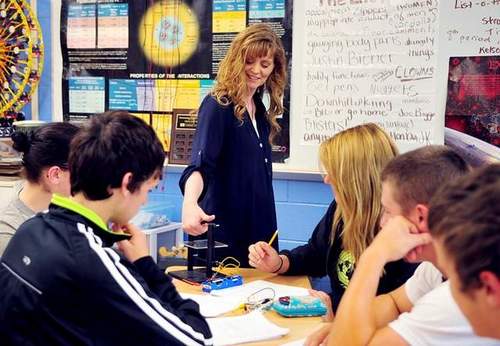
First off, there's a lot of information out there, and it's really difficult to sift through. For example, should I use active engagement? Do I need to worry about making my course too easy? What about negative opinions that students have about science, and its general unpopularity? What's the right way to assess student learning? Why even bother with college at all? And there are so many different approaches out there, whose model should I follow? Richard Claude's? Steinn's? Or perhaps you'll take the path of least resistance, and simply do it the way you were taught?
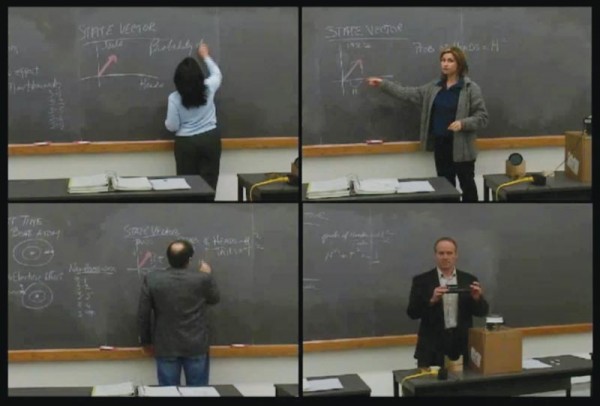
There's no better time to reflect upon the academic year that just ended. Professors are finishing their semesters and receiving their teaching evaluations, new faculty are getting ready for their first years in the fall, and yet we seem to be headed towards a one-size-fits-all model of education.
With all this in mind, here are my top tips for teachers, that reflect what I've learned over my life -- so far -- in my capacities as an educator in all sorts of different realms.
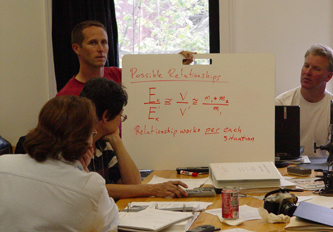
1.) Take pride in being as good a teacher as you can. I really, really mean this one. If you can't take this step, get out. If you can't bring yourself to care enough to really bring an outstanding effort to your teaching, in terms of planning, preparation and delivery, there is nothing I (or anyone else) can tell you that will make you a good teacher.
What does this mean? It means that you're going to commit to using everything you've got and everything you know to give your students the best learning experience you can give them in the time you have together.
Are you on board? Then you're ready for the next step.
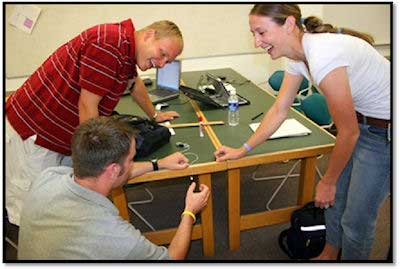
2.) Love the subject you're teaching. If you can't bring yourself to come in excited and enthusiastic for your lesson, how are you possibly going to get your students excited about it? But if you love it like it's the greatest thing in the world -- because for you, it actually is -- your students will know. And, for the most part, they'll appreciate that.
Don't even think about the pipe dream that all of your students are going to appreciate you all of the time. It won't happen, and if you're teaching to get that external validation from your students, you're pretty much always going to be disappointed. But if you love your subject, and you take pride in teaching it well, you've got it in you to be a great teacher.
What do you have to do?
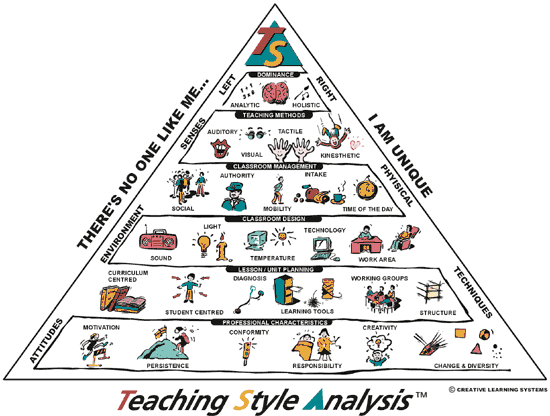
3.) Teach the right way for your own style. Not everyone can stand up in front of a class and do 60 minutes of calculus. Not everyone can deliver a compelling lecture on black hole formation. And not everyone can critique students' problem-solving ability in a constructive manner in a large lecture hall.
Teaching is as much about learning what works for students (and you know some of this: you were once a student) as it is about learning what works for you. I'm not saying you should never leave your comfort zone, but I am saying that following the latest education fad isn't going to make you a good teacher. Figuring out your style and working your lessons into a form that suits you and your style, however, may.
The United States is weird, with our obsession with assessment and standardized tests. I think that having standards, particularly in scientific fields, is important. But beyond that, it's important to recognize how the rest of the world does it.

4.) Feel free to develop your own curriculum, lessons, and teaching methods. In many other countries, believe it or not, you're not supposed to teach a standardized curriculum. I would argue, based on my experience, the best parts of any course are the parts you could not possibly standardize or test.
(Don't believe me? Read this teacher's story.)
Don't be afraid to be creative. And...

5.) Don't fall into the trap of having to cover everything. It's much better to do the best you can in the time you have to do it, and to choose what you think is most important, than it is to expose students to every little detail.
For me, this means that -- in an introductory physics course -- I spend a lot of time and effort on electricity and magnetism, but very little on compound lens systems or thermodynamics. For another introductory physics teacher, it could just as easily be the opposite, and it could still be a great physics course.
In point of fact, the other introductory astronomy teacher at my college probably only teaches about 30% of the same material I do in his version of Intro to Astronomy.

That's a good thing! He's not me, I'm not him, and although we both like each other and respect each other's courses, it's a big enough field that there are enough interesting things for the both of us. When you look at the image above, do you focus on the stars? On the tattered ribbons of hot gas? Or on the blackness of space?
My point is, they're all important, and they all have excellent lessons, and you don't do anyone any favors by compelling them to all teach the same things the same way.
Some other tips:
- You are fallible, and you should be able to admit to your students when you've done something that you wished you had done better.
- Model what you expect them to do. If you expect them to solve problems, solve some similar examples for them in class.
- Give them practice. If they're going to be tested on something, give them practice doing it. If the test questions are going to be hard, make at least some of the practice questions equally hard.
- And don't beat yourself up over the ones who don't try hard enough. Some of them won't, and they need to learn that lesson for themselves, even if it comes at your expense on your evaluations.
Don't get me wrong; interactivity is good. Assessments are good. But so are lots of other things.

If you've got a good knowledge of your subject and a dear love of both it and of teaching, you've got it in you to be a great teacher. But you've got to keep learning, you've got to take responsibility for your own shortcomings, and you've got to give it your all to teach them what you believe is important for them to learn. You're going to make mistakes, and so are they. But if you go, day-by-day, on the journey of what everyone's learning, and you pay attention, and you work to get better at it (and to help them get better at it), that's how you become great. The rest of it -- what most people focus on -- those are just details. Get the big issues right, and you just might discover, for a teacher, what really matters.

I am and always have been the best teacher in my department--Mid size high school in the midwest--but in the last 3 years we have been forced to do the same lesson on the same day in the same basic way--all so that we can give the same assessment on the same day in the same way (authentic assessment). Our department chair fully supports this--he is the most ineffective, least innovative member of our department, but the principal gets to choose who is chair and he chooses the one who is least likely to be proactive. WTF do we the teachers who care do??? I am an inch away from giving up as an educator.
Haha, I just had to write an essay on what it takes to be an outstanding educator for a teaching application, and I covered a lot of the same points! That feels good, thanks.
Rheb-El, I hope that you can find some way to make this process more effective. Can you affect what "the same basic way" is for many of the lessons? Can you professionally challenge your chairs decisions? I wish you, and your students, the best.
I'll tell this story again. My high school physics class, the first semester, we all went out to the quad and plotted the motion of Mars and Venus through a telescope. Which meant, of course, understanding that the heavens move throughout the night, and that we either a) had to take their measurements at the same time, or b) relative to some of the fixed stars. The teacher was meanwhile teaching us about Ptolemy's epicycles and equants, and as the graph developed, we would see whether it lined up with that theory.
All of which I thought was dumb. I was taking calculus for math. I understood Newton's laws, and why they led to elliptical orbits. Why was this physics class making us learn about a baroque theory that was four centuries obsolete? Why were we measuring planetary motion with a rinky-dink high school telescope?
Decades later, I think it was a good introduction, not just to physics, but to science. The field -- the outdoors that is full of bugs and plants and birds and, these days, trash, that is different the next town over, where stars are seen and weather happens, and that changes with the seasons and the climate -- comes before anything else. Problems arise because someone notices something interesting. The data is imperfect because the field is a messy place. It takes a lot of hard work to get interesting data. Obsolete theories came from people just as smart as anyone today thinking on the problems at the time, looking at the data of the time, trying to make sense of it all. We're not better, but just have the advantage of living when and where we do.
So now I have a bias: get students into the field early, get them into the field often, get their hands dirty, make them futz around with old-style instruments, insist they bring back some data.
Of all the teachers I had only a few stand out. Those were (wo)men who made me think and who would and could discuss.
People who made you look outside the box etc. Who provoked you. Stirred your curiousity.*
One stands out specially.
Frau Handovski. She was a ritired theacher who gave extra lessons to kids like me.
She tutored me through a summer to get my german up to higher standard.
She was fun, stern, warm, very good in discipline and totally of todays world and very knowable.
We started the day with some tedious things. And then we would read a german newspaper with a cup of coffee. And then ended up discussing the news. Being it politics, science or whatever.
Or whatever took our fancy. All in german of course. The deal was five days a week, three hours in the morning. But often it was much later that I went home.
At the end of the summer my german was excellent and I never had such a good time while learning a language.
She was a great person to have known.
*My gift for my first nephew who was born in februari this year was a very small mono-prismatic 8x20 with a card simply saying "Be Curious!" which his parents thought was the best gift they got.
I've got a story like that: Near the end of the year in 7th grade, the class spent some time investigating pyramid power (I know, that really dates me :-) Sounds silly, right? But here's the deal. We had to figure out what pyramid power effect we wanted to measure (we settled on sharpening old razor blades), how to measure sharpness in an objective, quantitative way, etc.
In the last two days, the different teams gave their reports. The times being what they were, this consisted of various analyses of why our experiment was "wrong". I'll never forget what Mr. Ford after the last speaker was done - "Did anyone think that maybe that got no results because pyramid power can't sharpen razor blades?"
Light Bulb! Thank you Mr. Ford, wherever you are, for teaching us in your hands-on fashion about why the scientific method is so important. Strong stuff for a jr. high school kid who thought science was Arcot, Wade, and Morey.
Thank you for a really great post. 'What makes a good teacher' is something you hear a lot of in the staffroom, but alas! many of the things you mention just don't seem to make it onto some people's lists. Over the years I've cut waaaay back on the amount of content that I cover, to let me spend time with the students on core ideas & on learning to think like a scientist. This has earned a certain amount of displeasure in some quarters, which I tend to ignore/sidestep - I can get do this because I'm experienced & have been a successful teacher for a long time, but it must be so hard for new young teachers, just beginning their careers, who are keen to innovate.
I have just finished the school year with a class of grade 11 physics students. One of the best parts of this particular group was their interest and effort in pursuing "bunny trails". You know, asking questions with the intent of getting the teacher "off the curriculum" so they wouldn't have to do any "work". The funny thing is, whatever their original intent was, inevitably one thing would lead to the next and they would be pursuing the science they were actually interested in. Not only that, but they weren't trying to get away from science -- the things they were asking about really were connected to what we were "supposed to be learning about" anyway. It was so much fun! We spent quite a bit of time on a number of occasions talking like this, and it felt like one of the best times I've had to inspire students to love science and to learn more on their own. I'm looking forward to having this group back for the grade 12 course next year!
Incidentally, in our school there is also a push for all teachers to teach the same material, although thankfully there is not much emphasis on HOW we do it. One of the things I like best about the Physics course is that I'm the only one teaching it so there is no one to "match" -- I get a lot more freedom to do what I want.
Thank you! Your 3, 4, and 5--and your other tips--summarize almost exactly the problems I had at my last two high schools (and the exact problems I don't have where I teach college). Far too much emphasis on teaching it all, teaching it to the test, teaching exactly the same as everyone else, and--this got me removed from one job--administrators assuming that, well, everyone should pass! If they're not doing the work, obviously I'm giving them too much, poor things. /sigh
Still frustrated even though I didn't teach HS last year.
Re graph of Percent of people expressing a high level of trust in others, 2008
What the heck is in the water in Scandinavia?! Oxytocin?
Disclaimer, I live in the US and since 2008 my personal level of trust for American corporate leaders, bankers and government officials has fallen significantly below the general level of trust of the Chileans.
from my point of view Teaching is an honorable profession,and all key points are very important to keep in mind for becoming a good teacher i love this profession.
hmmmm.... intresting that most comments are from teachers.
Shows clearly that most students don´t give a thing.
Shame.
I learned to read in tears. I was stupid, lazy and shamed in front of the third grade class as one of three students who would fail. Reading, history, writing and other vocabulary intensive subject were beaten out of me. My dyslexia was diagnosed 20 years later.
I remember only one history teacher. College Ancient Greek history. I was lousy with dates and names of people and places; but his excitement came through. On vacation, he'd make rubbings with paper and charcoal. I don't remember a single other thing that he taught; but I still read Greek history. He opened a door for me; that had been slammed shut in third grade. I got only a C in his class. He was a good teacher.
A teacher just needs to be good enough. I am thinking of a so called "excellent teacher" of high school choir; who was a very poor teacher for my daughter. Choir was an optional course for my daughter. She just wanted to learn to sing. But this teacher renowned for putting on excellent shows every year; only discouraged my daughter and other girls whose voices had not yet matured and stabilized. A changing uncontrollable voice was of little use for this "excellent" teacher's acclaimed shows.
The first rule of any professional (teachers included) is: Do No Harm!!!
I think in my whole life at school I met one teacher (Geography)who got me interested in the subject. Apart from him, I can only remember three other teachers' names: The rest have been blocked out of memory and I only remember these three because they had taken the pursuit of sarcastic sadism to an art form, whereas the rest were mere amateurs. I only passed exams to spite them and left school at the earliest opportunity. I'm sorry to say, as a result,I have no respect for the teaching profession whatsoever.
"In many other countries, believe it or not, you're not supposed to teach a standardized curriculum"
Wasn't Michelle Bachman championing this very idea recently, suggesting that the states, not the federal gov't set standards for teaching creationism?!
Watch waiting for superman, as a high school student, it probably changed my life, and the way I look at the education system....
very good, we have 30 teachers and we want to make them best
god bless you
swamiji
monk and social activist